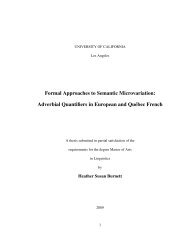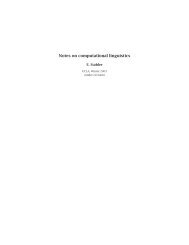Post Verbal Subjects and Agreement in Brazilian Portuguese
Post Verbal Subjects and Agreement in Brazilian Portuguese
Post Verbal Subjects and Agreement in Brazilian Portuguese
Create successful ePaper yourself
Turn your PDF publications into a flip-book with our unique Google optimized e-Paper software.
6. SUMMARY<br />
This thesis <strong>in</strong>troduced two BP patterns of verb agreement <strong>in</strong> BP (obligatory<br />
agreement <strong>and</strong> variant agreement).<br />
Adopt<strong>in</strong>g Moro’s (1993, 1997) analysis of copular sentences, I established<br />
that the variant pattern is restricted to cases of post-verbal subjects. As a<br />
consequence of this f<strong>in</strong>d<strong>in</strong>g, the BP pattern discussed here provides new data which<br />
serves as additional support for the proposals <strong>in</strong> Moro (1993, 1997)).<br />
I then proposed an analysis where the two-agreement pattern arises from the<br />
possibility of hav<strong>in</strong>g different elements <strong>in</strong> spec-TP: either a predicative null<br />
expletive (similar to English there), a clausal null expletive (similar to English it) or<br />
a predicate DP. In the case of unaccusatives <strong>and</strong> existentials, the two agreement<br />
patterns where proposed to be due to the possibility of rais<strong>in</strong>g either the predicate<br />
expletive or a clausal pronoun to spec-TP. Obligatory agreement occurs <strong>in</strong> pre-<br />
verbal subject environments, where the verb agrees with the subject when it raises<br />
to spec-TP.<br />
46

















